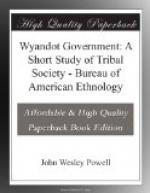These “gentes” are organized into tribes by ties of relationship and affinity, and this organization is of such a character that the man’s position in the tribe is fixed by his kinship. There is no place in a tribe for any person whose kinship is not fixed, and only those persons can be adopted into the tribe who are adopted into some family with artificial kinship specified. The fabric of Indian society is a complex tissue of kinship. The warp is made of streams of kinship blood, and the woof of marriage ties.
With most tribes military and civil affairs are differentiated. The functions of civil government are in general differentiated only to this extent, that executive functions are performed by chiefs and sachems, but these chiefs and sachems are also members of the council. The council is legislature and court. Perhaps it were better to say that the council is the court whose decisions are law, and that the legislative body properly has not been developed.
In general, crimes are well defined. Procedure is formal, and forms are held as of such importance that error therein is prima facie evidence that the subject-matter formulated was false.
When one gens charges crime against a member of another, it can of its own motion proceed only to retaliation. To prevent retaliation, the gens of the offender must take the necessary steps to disprove the crime, or to compound or punish it. The charge once made is held as just and true until it has been disproved, and in trial the cause of the defendant is first stated. The anger of the prosecuting gens must be placated.
In the tribal governments there are many institutions, customs, and traditions which give evidence of a former condition in which society was based not upon kinship, but upon marriage.
From a survey of the facts it seems highly probably that kinship society, as it exists among the tribes of North America, has developed from connubial society, which is discovered elsewhere on the globe. In fact, there are a few tribes that seem scarcely to have passed that indefinite boundary between the two social states. Philologic research leads to the same conclusion.
Nowhere in North America have a people been discovered who have passed beyond tribal society to national society based on property, i.e., that form of society which is characteristic of civilization. Some peoples may not have reached kinship society; none have passed it.
Nations with civilized institutions, art with palaces, monotheism as the worship of the Great Spirit, all vanish from the priscan condition of North America in the light of anthropologic research. Tribes with the social institutions of kinship, art with its highest architectural development exhibited in the structure of communal dwellings, and polytheism in the worship of mythic animals and nature-gods remain.




